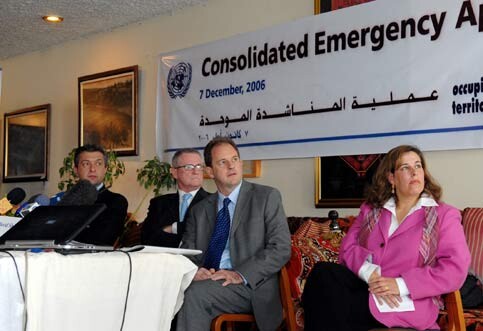IRIN 8 December 2006

UN aid agencies and NGOs have launched a US$450 million emergency appeal, the biggest-ever for the Palestinians and the third-largest in the world. (Tom Spender/IRIN)
United Nations agencies and NGOs have launched a US$450 million emergency appeal for humanitarian aid for the Palestinians – the biggest-ever for the Palestinians and the third-largest in the world.
So much money is needed because two-thirds of Palestinians in the West Bank and Gaza Strip have fallen into poverty, said Kevin Kennedy, the UN’s humanitarian coordinator.
The international boycott on the Hamas-led Palestinian government has crippled the Palestinian economy. International donors say they will only give money directly to the Palestinian people if Hamas recognises Israel’s existence, renounces violence and abides by previous agreements between Israel and the Palestinians.
In addition to the international boycott, Israel has withheld an estimated $500 million in tax revenues from foreign and Israeli goods heading for the West Bank and Gaza, which it would normally hand over to the Palestinian National Authority (PNA).
“We have been compelled to launch a larger appeal in the face of the increased need among the Palestinian population,” said Kennedy. “It is particularly aimed at assisting the most vulnerable Palestinians, including children, who make up about half of the population.”
Because of the freeze, the PNA, which relies on foreign aid, has not been able to pay its 160,000 employees, who support another million family members.
“Growing numbers of people are unable to cover their daily food needs and agencies report that basic services such as health care and education are deteriorating and set to worsen much further,” he added.
Most of the 2007 emergency funding sought will go towards addressing poverty through emergency employment programmes, and expanding food and agricultural aid, as well as supporting health, education and psycho-social services.
The appeal also includes a protection sector in response to the increased death toll and vulnerability of Palestinian civilians, which will see UN offices documenting Palestinian deaths and injuries in greater detail and campaigning harder for their human rights to be recognised.
“Humanitarian assistance can cushion a deteriorating situation, but it ultimately cannot stop the decline,” warned David Shearer, head of the UN Office for the Coordination of Humanitarian Affairs (OCHA).
Mark Regev, a spokesman for Israel’s Ministry of Foreign Affairs, said Israel would not release the tax revenues due to the Palestinians until Hamas meets the international community’s demands.
“The international community has said it does not want to fund a government that teaches hatred and terror and neither do we,” he said. “The best solution would be for Hamas to meet the three benchmarks, which were agreed by the UN, of renouncing violence, recognising Israel and abiding by previous agreements. Then the money will flow again. In the meantime, Israel fully supports humanitarian intervention in the Palestinian territories.”
Palestinians are also increasingly limited in their access to jobs, markets, health services and schools, UN officials added. By October this year, there were more than 500 checkpoints, roadblocks and other restrictions on movement across the West Bank. In Gaza, the only border open to ordinary Palestinians is the Rafah crossing into Egypt and it has only opened sporadically since an Israeli soldier was kidnapped by Hamas militants in June.
“The loss of life, livelihood and security in the oPt is most distressing. It is increasingly difficult for people to cope in such a volatile and unpredictable environment,” said Karen Koning AbuZayd, commissioner-general of the UN Relief and Works Agency, which looks after Palestinian refugees.
The appeal for a total of $453.6 million was jointly launched by 12 UN agencies and 14 NGOs working with the Palestinians.
But Shearer warned that the UN and NGOs should not find themselves becoming a substitute for a defunct PNA.
“We are anxious to help the most needy maintain their dignity and have income. But the humanitarian community is not in a position to provide the full range of services offered by the Palestinian Authority – and has no ambitions to do so,” he said.
“Ultimately only a political settlement can generate a significant improvement,” he added.
This item comes to you via IRIN, a UN humanitarian news and information service, but may not necessarily reflect the views of the United Nations or its agencies. All IRIN material may be reposted or reprinted free-of-charge; refer to the copyright page for conditions of use. IRIN is a project of the UN Office for the Coordination of Humanitarian Affairs.
Related Links